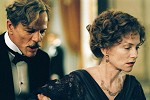 Arthouse films ’06
Arthouse films ’06< < M O R E | M O R E > >
last update 25.Nov.06
See also: SHADOWS FILM FESTIVAL | SHORT FILMS
 R E V I E W B Y R I C H C L I N E
R E V I E W B Y R I C H C L I N E Iklimler
Iklimler
 Like he did with Distant (2003), filmmaker Ceylan tells a virtually wordless story that makes remarkable use of settings and weather. Although this one's also rather meandering and dull.
Like he did with Distant (2003), filmmaker Ceylan tells a virtually wordless story that makes remarkable use of settings and weather. Although this one's also rather meandering and dull.
Isa and Bahar (Nuri and Ebru Ceylan) are a married couple on a summer holiday in Kas, exploring ancient ruins and lounging on the beach. And decidedly not talking about their strained marriage. Eventually Bahar goes back to Istanbul alone, and as the autumn rains begin to fall, Isa drifts back to his former mistress Serap (Kirilmis). But he can't get Bahar off his mind, so in the winter he heads to the snowy film location where she's working as an actress. Maybe they can create a new relationship from the ruins of the old one.
Virtually the entire plot is conveyed through scenes in which the characters sit quietly and watch each other. Conversations are fragmented and vague, only giving enough detail to let us follow the story. In other words, the entire film relies on the expressive faces of the actors, who are often doing absolutely nothing on the screen but gazing into the middle distance.
No, it's not particularly easy to watch. This is minimalist, experimental cinema that demands a commitment from audiences and rewards them with a strikingly insightful examination of relationships. But the impact comes from within, as we identify with these people and their desperations, selfish reactions, hopeful glances--all so subliminal that we could miss them if we're not paying attention. Even their "confrontations" are silent, communicating through body language rather than words.
As a director, Ceylan films in extremely long, static takes that highlight even the tiniest movement. He's unusually adept at catching locations on film, and allowing them to become a telling part of the story. He's also a nicely subtle actor, although it's not easy to make out what exactly Isa wants out of life (having his cake and eating it too springs to mind). In the end, this is a beautifully shot, introspectively acted film that's also painfully slow and fairly indulgent. For adventurous filmgoers only.
with Nuri Bilge Ceylan, Ebru Ceylan, Nazan Kirilmis, Mehmet Eryilmaz, Arif Asçi, Can Ozbatur, Ufuk Bayraktar, Fatma Ceylan, Emin Ceylan, Semra Yilmaz, Ceren Olcay, Abdullah Demirkubuz

release Tur 20.Oct.06, US 27.Oct.06, UK 9.Feb.07
06/Turkey Pyramide 1h41
Fipresci Prize:
CANNES FILM FEST
TORONTO FILM FEST
LONDON FILM FEST
24.Nov.06
 R E V I E W B Y R I C H C L I N E
R E V I E W B Y R I C H C L I N E
 This Liverpool thriller is set in an underworld of nightclubs, drug dealers and territorial gangsters. In other words, it's yet another gritty, violent British crime movie. And while it has its moments, it doesn't really add to the genre.
This Liverpool thriller is set in an underworld of nightclubs, drug dealers and territorial gangsters. In other words, it's yet another gritty, violent British crime movie. And while it has its moments, it doesn't really add to the genre.
Tom (McMartin) is an ex-boxer who gets a job as a bouncer at a down and dirty bar owned by Billy (Bell), who dresses like a cowboy. Tom's wife (Janus) is not pleased, especially when he keeps coming home drunk. And she doesn't know about his fellow doorman Paul (Barber), a tough guy who likes to fight with the local street hoods. Or the slutty barmaid (Parry) who keeps buying Tom presents. But the real problem is the vicious gangster (Russell) who wants to take over the bar.
The title refers to a story Billy tells about Wild Bill Hickock and a handful of aces and eights. What that has to do with this film is never clear, but the movie does feel like a Western as everyone grabs their guns and heads for a series of increasingly violent showdowns. Marquand (son of Return of the Jedi director Richard) directs with considerable style, using lush colours and witty camera angles to cover the extremely low-budget production values.
Where the film falters is in the somewhat awkward dialog, which anyone would have trouble delivering convincingly. Some of these actors keep their dignity, while others never make their characters believable. Fortunately, McMartin is solid in the central role; he's the only person we have any sympathy for. Everyone else is so annoyingly cocky that you almost hope for an apocalyptic finale.
Amid the script's attempts to establish street cred, there are cleverly astute touches--such as the self-defence class Paul and Tom are required to take. But when the story starts circling through a series of attacks and counterattacks, each trying to be tougher than the last one, we feel the strain. There's just no point at which we can become involved in the story on any level, which leaves it feeling jumbled and a little silly in the end. Despite some flashes of real skill.
scr James Marquand, James McMartin
with James McMartin, Paul Barber, Tom Bell, Samantha Janus, Gary Mavers, Mark Russell, Lisa Parry, Andrew Schofield, Chris Finch, Robin John Barlow, Ben Simpson, Alex Wise
 release UK 15.Dec.06
release UK 15.Dec.0606/UK 1h30
8.Nov.06
 R E V I E W B Y R I C H C L I N E
R E V I E W B Y R I C H C L I N E
 Based on Joseph Conrad's novella The Return, this elegant and dramatically devastating film picks an empty marriage apart bit by bit. It's a sharp work of cinema that's not remotely easy to watch.
Based on Joseph Conrad's novella The Return, this elegant and dramatically devastating film picks an empty marriage apart bit by bit. It's a sharp work of cinema that's not remotely easy to watch.
In Paris a few years before the First World War, Jean (Greggory) is the master of a grand manor house, proud of his reputation as a host, his many possessions and his wife Gabrielle (Huppert). In that order. When Gabrielle leaves a letter saying she's found another man (Hancisse), Jean reacts as if he's been robbed. So when Gabrielle returns home in tears, nothing can be the way it was before.
Chéreau constructs this story with flashbacks in varying shades of colour and monochrome, with large on-screen captions to tell us where we are. He keeps the tone almost pathologically low-key, with incessant narration that only pauses long enough for a line of dialog to squeeze in before continuing on. And yes, this is fairly exhausting for viewers who don't speak French. Only fast readers will have time to take in the remarkable camera work, production design and, especially, the transparent but steely performances.
Huppert delivers another of her icy turns, barely moving a muscle and yet conveying the deep waves of turmoil within Gabrielle's soul. She also gives the character a jagged wit that slices through everyone she encounters. Meanwhile, Greggory has the much less sympathetic role as a sanctimonious jerk behaving like a spoiled prince who has far too much power and privilege. And yet, Greggory finds some tiny shard of inner dignity, even as we know Jean would feel better if Gabrielle was dead.
The script is pretentious and not very cinematic, leaving whole film claustrophobic and stagy. It's basically just two people locked in a manipulative battle of wits--she's wounded and still, he's smug and brash. But Chéreau directs it to astutely capture the central relationship, playing on the limited settings and the rigid class system (Gabrielle has three women to dress her). This adds another layer of meaning that turns remarkably chilling with the final turn of the screw.
scr Patrice Chéreau, Anne-Louise Trividic
with Isabelle Huppert, Pascal Greggory, Claudia Coli, Thierry Hancisse, Chantal Neuwirth, Rinaldo Rocco, Thierry Fortineau, Louise Vincent, Clément Hervieu-Léger, Nicolas Moreau, Xavier Lafitte, Raina Kabaivanska
 release Fr 28.Sep.05,
release Fr 28.Sep.05, US 14.Jul.06,
UK 17.Nov.06
05/France Studio Canal 1h30
VENICE FILM FEST
TORONTO FILM FEST
19.Oct.06
 R E V I E W B Y R I C H C L I N E
R E V I E W B Y R I C H C L I N E
 Chilean writer-director Scherson makes an auspicious feature debut--yet another seriously gifted young filmmaker from South America. It's a beautifully assembled, elegantly elusive tale of love and obsession across class barriers.
Chilean writer-director Scherson makes an auspicious feature debut--yet another seriously gifted young filmmaker from South America. It's a beautifully assembled, elegantly elusive tale of love and obsession across class barriers.
Cristina (Herrera), from a working class rural Indian family, works as a maid for a dying Hungarian man (Copello). Her structured life is interrupted by the discovery of a lost briefcase belonging to middle-class architect Tristan (Ulloa), who she decides to follow around town. As she studies him, we learn his story as well. His long-term girlfriend (Küppenheim) has just dumped him, so he moves back to the wealthy suburbs with his blind mother (Guazzini) and her current toy boy (Alis). Is there any chance at all that Cristina and Tristan can find each other?
Scherson is clearly making a point about the seemingly insurmountable racial and economic boundaries in Latin America, but she does it with a thoroughly light touch, focussing on the romantic misadventures as these two characters wander the streets of Santiago in search of meaning and compassion. This is filmed with a witty use of camera, sound and editing, playfully carrying us through the story with a smile on our faces, even when we're watching something that's actually rather sad.
Cristina's stalking takes on a sensual flavour as she watches, tastes, smells, listens to and even surreptitiously touches Tristan. But it's never menacing; she's a curious sprite, attracted by this handsome young man and also fascinated by the way the other half lives. The contrast with her much more brazen flirtation with a local gardener (Quezada) is striking. Meanwhile, Tristan is slowly reassessing his entire life, making new judgements about himself and others, and taking some drastic steps toward independence.
The film is so loose and fresh that we begin to wonder if these two will ever actually meet each other properly. Their lives seem to exist in alternate universes. This multi-strand approach has echoes of Amores Perros, although with magician's bunnies instead of killer dogs. While Cristina's mischievous blending of reality and fantasy are reminiscent of Amelie. And while it may feel somewhat superficial, the film's final sequences are packed with provocative subtext.
with Viviana Herrera, Andres Ulloa, Aline Küppenheim, Coca Guazzini, Jorge Alis, Juan Pablo Quezada, Francisco Copello, Andrei Slobodianik, María José San Martín

release Chile 8.Sep.05, UK 19.Jan.07
05/Chile 1h45
6.Nov.06


See also: SHADOWS FILM FESTIVAL | SHORT FILMS
© 2006 by Rich Cline, Shadows
on the Wall